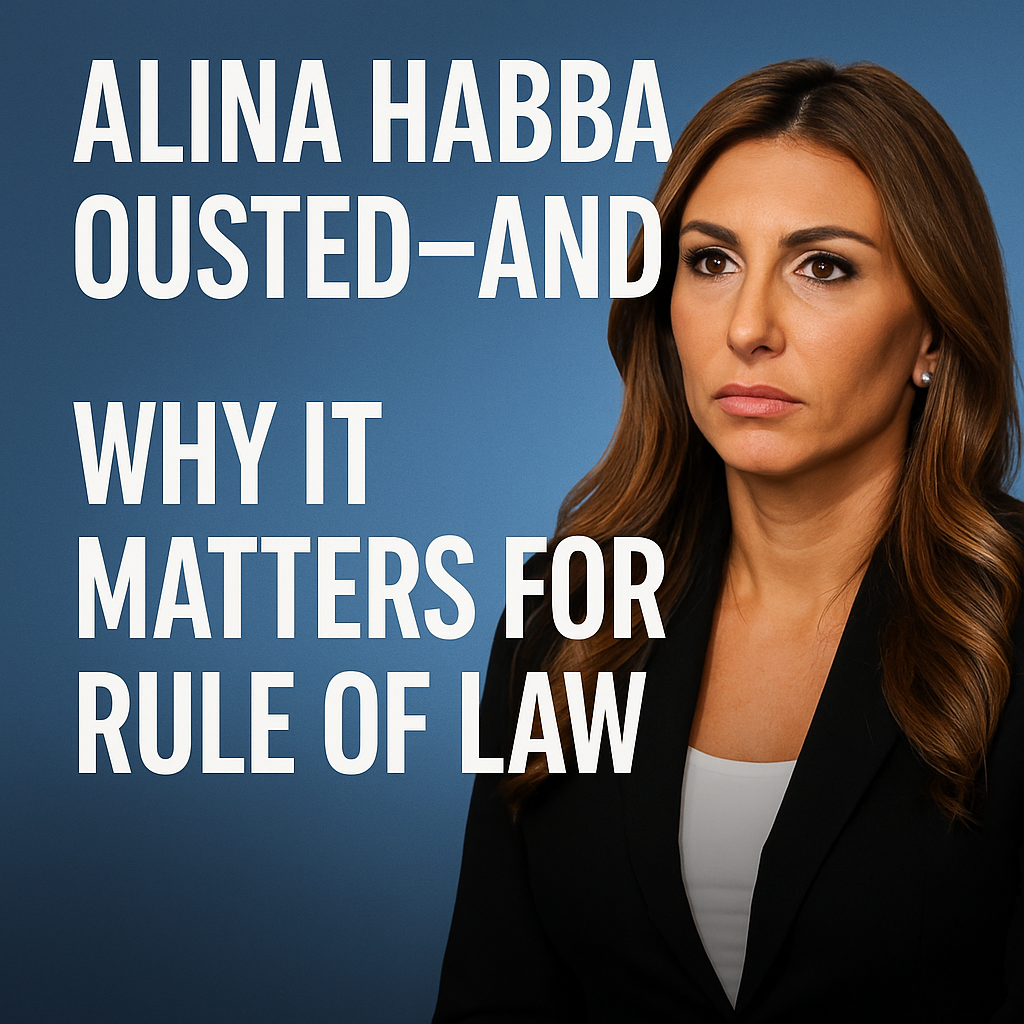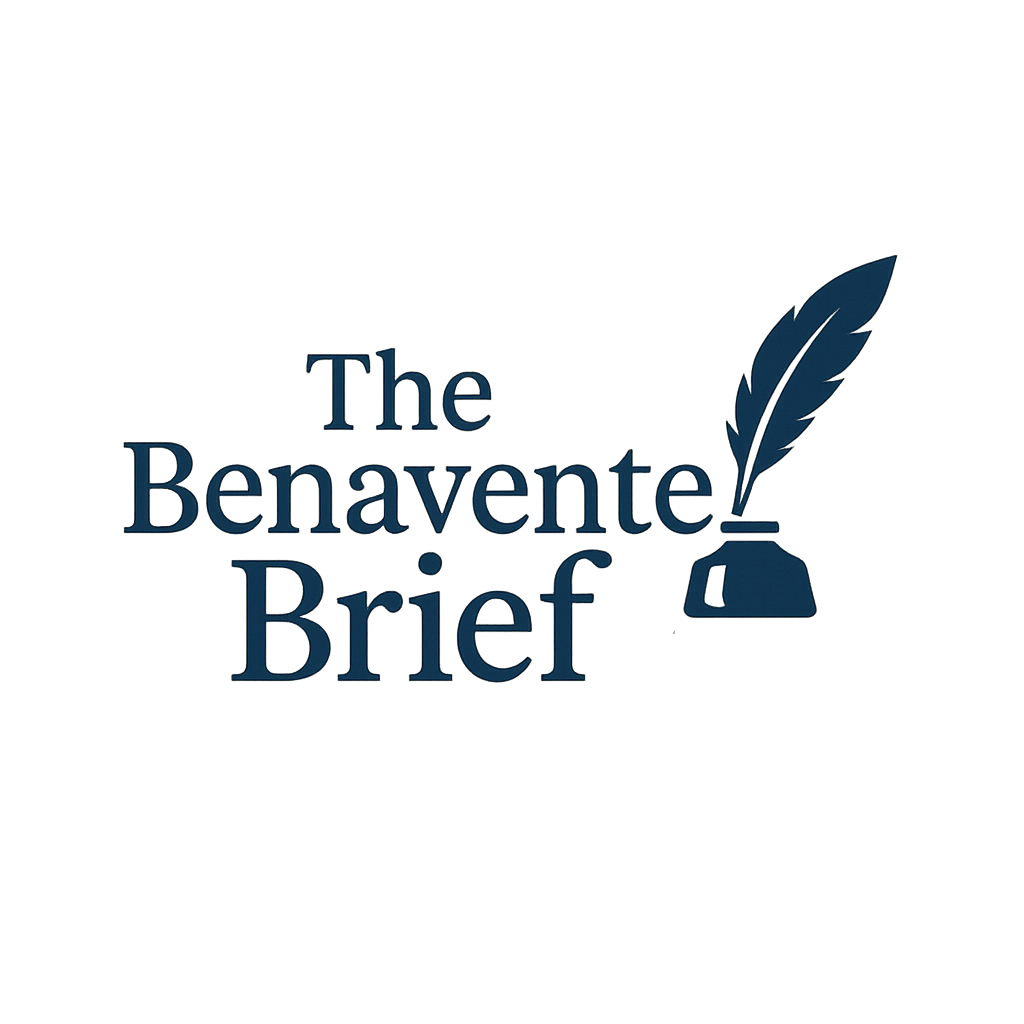Why Alina Habba’s Dismissal Is a Warning Sign for Rule of Law
This development highlights a broader struggle over judicial independence, the separation of powers, and the increasing politicization of top federal appointments.-Rafael Benavente

Alina Habba Ousted—and Why It Matters for Rule of Law Update
By Rafael Benavente
Introduction
Former President Trump’s attorney, Alina Habba, was recently ousted from her role as interim U.S. Attorney for the District of New Jersey. This development highlights a broader struggle over judicial independence, the separation of powers, and the increasing politicization of top federal appointments.
🚨 What Happened: A Timeline of Events
- March 2025 – President Trump appoints Habba as interim U.S. Attorney for New Jersey, despite her lack of prosecutorial experience New York Magazine+15Wikipedia+15The Daily Beast+15Vox+1New York Magazine+1.
- July 22, 2025 – Her 120‑day term expires, requiring Senate confirmation for retention 6abc Philadelphia+8Politico+8The Washington Post+8.
- Federal judges invoke historical law to appoint Desiree Leigh Grace, a career prosecutor, as Habba’s replacement Wikipedia+15Politico+15The Washington Post+15.
- Attorney General Pam Bondi, a Trump ally, swiftly fires Grace and reinstates Habba, accusing judges of political interference Politico+13Politico+13Axios+13.
- The standoff sparks a deep legal showdown over presidential vs. judicial appointment powers The Washington Post+1Politico+1.
🏛️ Legal and Constitutional Implications
- Federal law allows district judges to appoint U.S. attorneys when interim terms lapse without confirmation—a rarely used mechanism New York Magazine+12Politico+12Democracy Docket+12.
- The Justice Department’s counteraction raises tough questions:
- Can the Attorney General override a judicial appointment?
- Or is that authority reserved solely for the President? Experts say so ABC News.
- This sets up a potential legal clash with long-term implications for checks and balances in federal law enforcement.
⚖️ Habba’s Controversial Tenure
During her brief stint, Habba initiated several politically charged prosecutions:
- Newark Mayor Ras Baraka and Rep. LaMonica McIver faced legal action related to a protest at an ICE facility—charges later dropped PoliticoPolitico+15AP News+15The Daily Beast+15.
- She also investigated New Jersey Governor Phil Murphy and Attorney General Matt Platkin concerning sanctuary policies 6abc Philadelphia+4AP News+4Al Jazeera+4.
- Critics argue these moves appeared more partisan than prosecutorial, raising concerns about justice being wielded as a political weapon 6abc Philadelphia+2Politico+2Vox+2.
🔥 Why This Matters
- Judicial independence vs. executive power: If unchecked, such firings could make U.S. attorneys political appointees beholden to administration agendas.
- Impact on prosecutions: These office shifts can disrupt ongoing cases and shake public confidence in fair justice.
- Precedent-setting: This conflict may define future boundaries between the executive and judiciary branches.
🔄 What Comes Next
- Will Senate confirmation of Habba advance, or stall like last time?
- Could this dispute lead to court challenges about executive authority vs. judicial appointments?
- Will future U.S. attorney vacancies trigger similar constitutional standoffs?
👤 Final Thoughts
The Alina Habba saga isn’t just a headline—it’s a litmus test for how we value integrity in the Justice Department. At its core, it’s about whether our legal systems will remain beyond political whims—or bend to them.
By Rafael Benavente
🔗 Sources for Reference
- ABC News: DOJ fires replacement after judges choose Grace Wikipedia+14ABC News+14AP News+14Democracy Docket+4New York Magazine+4Axios+4
- Politico: Judges reject Habba bid for tenure PoliticoAl Jazeera
- AP News: Legal showdown explained AP NewsAl Jazeera
- Washington Post: Separation of powers dispute New York Magazine+2The Washington Post+2Politico+2
